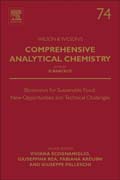
Biosensors for Sustainable Food - New Opportunities and Technical Challenges
Scognamiglio, Viviana
Rea, Giuseppina
Arduini, Fabiana
Palleschi, Giuseppe
Biosensors for Sustainable Food - New Opportunities and Technical Challenges addresses the challenges associated with sustaining the globally increasing demand for food that has been forecast for the next centuries and the immediate need for the food production system to adopt sustainable practices to protect the environment and human health. It provides a comprehensive overview of established, cutting-edge, and future trends in biosensor technology and its application in the agrifood sector. In particular, different biosensing advances are covered, outlining the newest research efforts in the cross-disciplines of chemistry, biology, and materials science with biosensing research, in order to develop novel detection principles, sensing mechanisms, and device engineering methods. Food production and consumption have a strong impact on the environment in terms of greenhouse gas emissions, water, and soil contamination, the reduction of arable land, water consumption, and many other factors, which in turn, negatively affect human health. These issues have consequences for economic development, too. To address these challenges, it is necessary for scientists with different expertise, policymakers, and economists work together to develop new smart technologies and introduce them to the market, along with adequate regulations. In this regard, a sustainable food production system can be thought of as a chain of procedures with a low impact on the environment that guarantees a secured supply of healthier and fortified food while supporting economic growth. Presents an interdisciplinary approach to biosensor technology Profiles recent advances in synthetic biology, new material design (biohybrids), nanotechnology, micro/nanofluidics, and information technologyAims to facilitate the transfer of agrifood biosensor technology from the laboratory to the market INDICE: 1. Biosensor potential in pesticide monitoring Giovanna Marrazza 2. Trends on biosensing systems for heavy metal detection Neelam Verma 3. Electrochemical, optical, and mass-based biosensors to reveal pathogens and toxins Ashok Mulchandani 4. Biosensor-based technologies for the detection of pathogens and toxins Richard O'Kennedy and Kara Moran 5. Biosensor to ensure food security and environmental control Gennady Evtugyn 6. Biosensors as indicators of food quality: CYBERNOSE® and CYBERTONGUE® technology for food and beverage quality monitoring Stephen Trowell 7. Bioinspired mimetic receptors: Aptamers as synthetic receptors for food quality and safety control Maria Jesus Lobo-Castañon 8. Biomimetic surfaces versatility for developing sensors for phytonutrients assessment Simona Carmen Litescu 9. Emerging nanomaterial for analytical detection Arben Merkoçi 10. Bio-compatible integration of electronics into food sensors Liviu Mihai Dumitru 11. Food (Bio)microfluidics Alberto Escarpa and Miguel Ángel López 12. Commercially available biosensors for food quality and safety Maria Alice Zarur Coelho 13. Laser scanning approaches for crop monitoring Dirk Hoffmeister 14. Robotic based agriculture for rural renaissance: drones and biosensors Sivabalan Kulandaivel Chellappan 15. Intelligent food packaging Semih Otles 16. (Bio)sensor integration with ICT tools for supplying chain management and traceability in agriculture Mimoza Durresi
- ISBN: 978-0-444-63579-2
- Editorial: Elsevier
- Encuadernacion: Cartoné
- Páginas: 500
- Fecha Publicación: 01/09/2016
- Nº Volúmenes: 1
- Idioma: Inglés
